
World
20:14, 26-Oct-2018
Despite 'trade war,' Americans do not view China a threat
Updated
20:14, 29-Oct-2018
By Abhishek G Bhaya
00:30
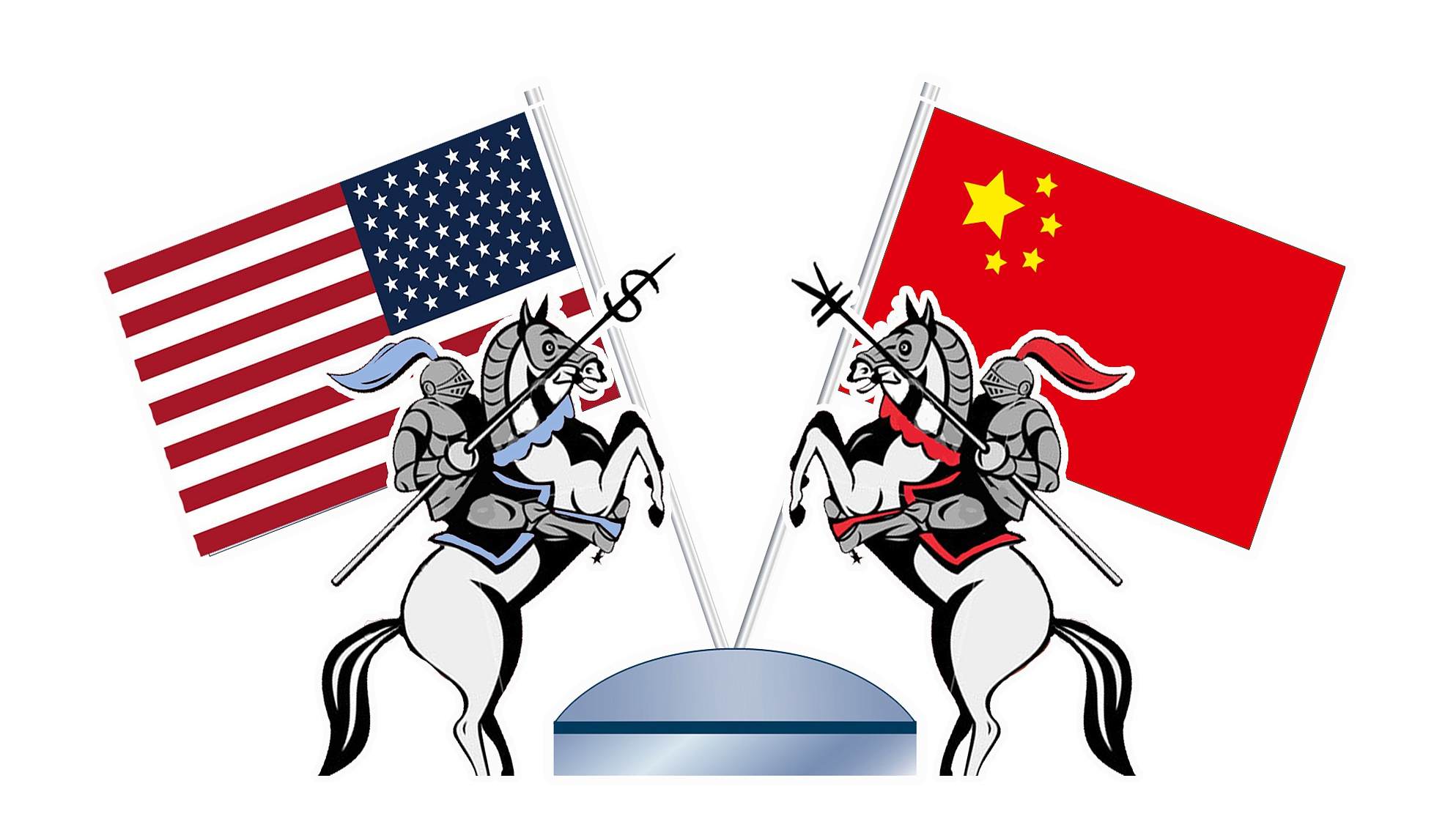
Regardless of the escalating "trade war," most Americans do not see China's rise on the global stage as a worrying threat; on the contrary, an increasing number of young Americans hold a favorable view of China, according to recent polls by the Chicago Council on Global Affairs and Pew Research Center.
Half of the respondents to the survey think China and the US are partners, which is more than the 49 percent who see the Asian giant as a rival; whereas Pew's poll shows that 72 percent of Americans believe China plays a more important role in global affairs than it did 10 years ago.
Reacting to the findings, the Chinese Foreign Ministry on Thursday stressed that the polls indicated American people's desire to have better relations with China.
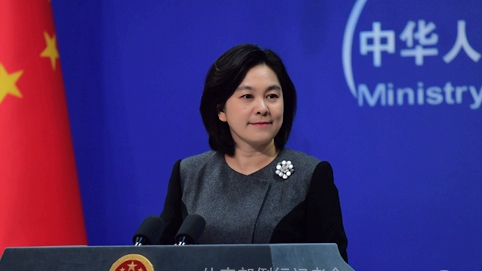
China's Foreign Ministry spokesperson Hua Chunying addresses a press conference in Beijing, Oct. 25, 2018. /Photo via China's Ministry of Foreign Affairs
China's Foreign Ministry spokesperson Hua Chunying addresses a press conference in Beijing, Oct. 25, 2018. /Photo via China's Ministry of Foreign Affairs
"The polls you have mentioned clearly showed that most American people expect that China and the US have stable and healthy relations and hope to enhance exchanges and cooperation with China," Hua Chunying, spokesperson of the ministry, told reporters at a press conference in Beijing.
"We would like to enhance dialogue with the United States, strengthen mutual trust, deepen cooperation and handle differences appropriately, so as to push China-US relations forward on the right track. This is not only in the interests of the two countries, but also meets the expectations of the two peoples," she said.
Hua also emphasized that "over the past 40 years since China and the US established diplomatic ties, people from both the countries have played an important role in the development of bilateral relations."
Partners or rivals?
Since taking office, US President Donald Trump's administration has pursued a far harder line than its predecessors on US-China relations. China was declared a "strategic competitor" in the 2017 US National Security Strategy and Washington has since declared a "trade war" against Beijing.
Irrespective of Trump's active efforts to portray Beijing in a negative light amid the ongoing "trade war," the majority of Americans do not view China as an urgent threat to national security, the Chicago Council stated as it published the findings of its poll last week.
"Despite the increasing confrontational rhetoric and actions emanating from Washington, the American public does not yet see China as a danger," it said.
Less than four in 10 (39 percent) say that the emergence of China as a world power is a critical threat to the US, ranking it eighth out of the 12 potential threats listed in the survey.
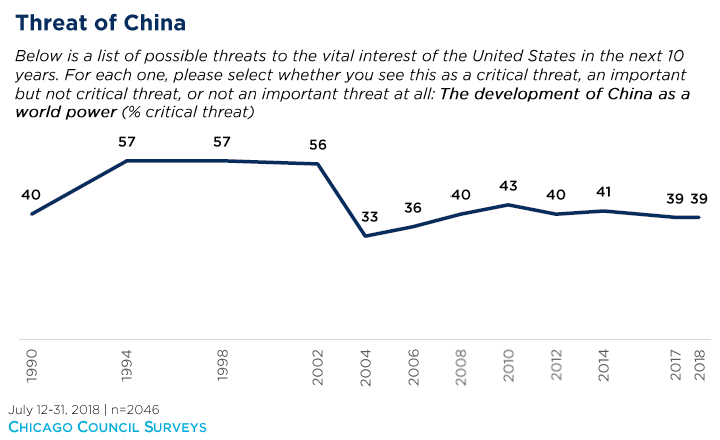
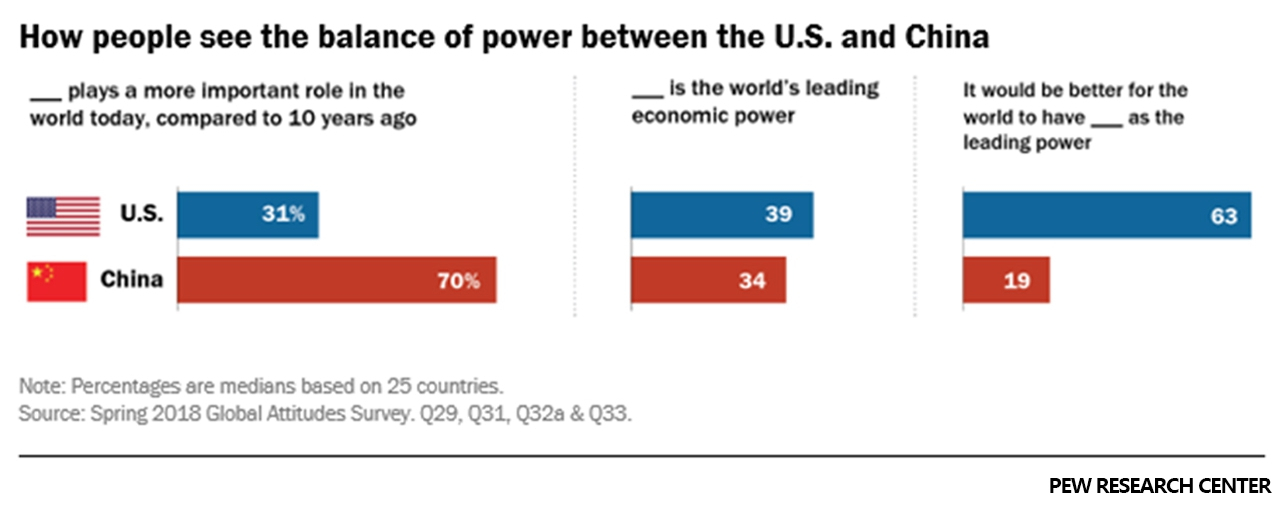
"This is well behind the perceived critical threat posed by international terrorism (66 percent), the DPRK's nuclear program (59 percent), and Iran's nuclear program (52 percent)," stated the Chicago Council, adding that "attitudes on China's potential threat are also highly consistent across party lines."
Another key finding of the survey is that a vast majority of Americans (72 percent) are either very concerned (31 percent) or somewhat concerned (41 percent) that the trade war with China would hurt their local economy. Also as many as 92 percent of Americans recognize China's importance to the US economy, with 57 percent ranking it "very important."
While the American public is more evenly split when asked to describe China as a partner or rival, with 50 percent choosing the former and 49 the latter; it still reflects a positive change in perception since the question was first included in Chicago Council surveys in 2006, when only 41 percent saw China as a partner while 49 percent took it as a rival.
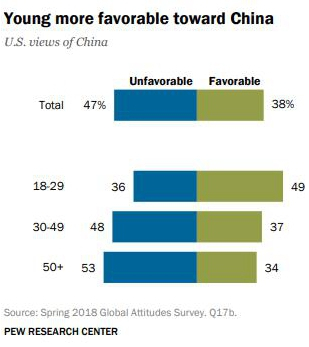
The Pew survey, conducted among 1,500 adults from May 14 to June 15 this year, also finds that young people typically have more positive attitudes toward China. About half of 18 to 29-year-olds (49 percent) express a favorable view of China, compared with only 37 percent of those aged 30 to 49 and 34 percent of people aged 50 and older.
Influence and respect
Both the Chicago Council and Pew surveys underlined that China's increasing influence in the world is acknowledged not only by the US but also universally.
The Pew poll which took feedback from 26 countries including the US showed that there is a widespread sense (median of 70 percent) that China plays a more critical role in the world today than it did 10 years ago. In comparison, 72 percent of Americans acknowledge China's increasing influence on the world scene.

"Although Americans still see the US as the more influential country, there is a clear recognition of China's rise as a power," the Chicago Council stated.
The survey also shows that over the past 12 years, the gap between perceived US and Chinese influence has narrowed from 2.1 points in 2006 to 1 point in 2018, with Beijing's influence rising from a mean of 6.4 (on a scale of 10) to a mean of 7.3 in 2008. Over the same period, American views of US global influence declined from 8.5 to 8.3.

With a steady growth in global influence, China is seen as commanding more respect in the world than it did a decade ago, according to the survey. A plurality of Americans (43 percent), consistent across parties, think China's respect in the world has risen, while a majority of respondents say that respect for the US has diminished over the same period.

SITEMAP
Copyright © 2018 CGTN. Beijing ICP prepared NO.16065310-3
Copyright © 2018 CGTN. Beijing ICP prepared NO.16065310-3